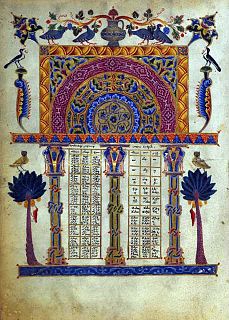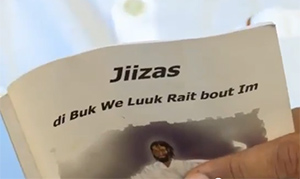 W
WBeck's American Translation is an abbreviated version of "The Holy Bible: An American Translation" by William F. Beck. The Lutheran Church–Missouri Synod's Concordia Publishing House published his "An American Translation--The New Testament In The Language Of Today" in 1963.
 W
WThe Bible of Kralice, also called the Kralice Bible, was the first complete translation of the Bible from the original languages into the Czech language. Translated by the Unity of the Brethren and printed in the town of Kralice nad Oslavou, the first edition had six volumes and was published between 1579 and 1593. The third edition, from 1613, is classic and till this day the most widely known and used Czech translation . The New Testament had been translated from the Greek by Jan Blahoslav and published in 1564.
 W
WThe Bible of Queen Sophia is the oldest surviving translation of the Old Testament into the Polish language and the first complete translation of the Bible into Polish. The work is seen as a significant milestone in the history of the Polish language, and the most extensive example of the medieval Old Polish language.
 W
WThe Armenian Bible is due to Saint Mesrob's early-5th-century translation. The first monument of Armenian literature is the version of the Holy Scriptures. Isaac, says Moses of Chorene, made a translation of the Bible from the Syriac text about 411. This work must have been considered imperfect, for soon afterwards John of Egheghiatz and Joseph of Baghin were sent to Edessa to translate the Scriptures. They journeyed as far as Constantinople, and brought back with them authentic copies of the Greek text. With the help of other copies obtained from Alexandria the Bible was translated again from the Greek according to the text of the Septuagint and Origen's Hexapla. This version, now in use in the Armenian Church, was completed around the year 434.
 W
WThe first northern Estonian language version of the New Testament was published in 1715, with the whole Bible of Anton thor Helle appearing in Estonian in 1739.
 W
WThe Bible was first translated into the Georgian language as early as the 5th century. The Vani Gospels is an illuminated manuscript of the gospels in the Georgian Nuskhuri script dating from the end of the 12th–early 13th centuries. Recently a new translation was completed by the Institute for Bible Translation.
 W
WThe first known translations of parts of the Bible into Slovak dates to 15th century, although full translations, as an alternative to Bible translations into Czech, date from the year 1756.
 W
WThe first translation of a sentence from the Bible to Slovene appeared in the Freising Manuscripts, dating to the 10th or the 11th century. The versions of the Bible for Slovenes are most closely connected with the activity of the Reformer of Carniola, Primož Trubar and his associates and successors. They were intended for the Protestant Slovenes. Trubar translated the Gospel of Matthew, which was printed at Reutlingen in 1555. In 1557, the first part of the New Testament was published at Tübingen, the second part in 1560, and the last part in 1577. The complete New Testament was reissued in 1582. The Psalms appeared in 1566.
 W
WThe history of Bible translations into the Tamil language commences with the arrival of Bartholomäus Ziegenbalg at Tranquebar in 1706.
 W
WThe known history of Bible translation into Ukrainian began in the 16th century with Peresopnytsia Gospels, which included only four Gospels of the New Testament.
 W
WIn the early part of the sixteenth century, there were already attempts to translate the Bible into Yiddish, including Hebrew-Yiddish biblical dictionaries. One of the most authoritative was the Bible that Jekuthiel Blitz translated in 1678.
 W
WThe Bible Translator is a peer-reviewed academic journal relating to theory and practice of Bible translation.
 W
WThe Bucharest Bible was the first complete translation of the Bible into the Romanian language, published in Bucharest in 1688.
 W
WThe Chinese Contemporary Bible is a Bible translation by Biblica of Colorado Springs, Colorado, published in 2012.
 W
WThe Chinese New Version is a Chinese language Bible translation that was completed in 1992 by the Worldwide Bible Society with the assistance of the Lockman Foundation. It was formerly known as the "New Chinese Version" (NCV), but the English name and abbreviation was changed to avoid confusion with the English New Century Version.
 W
WThe Elbasan Gospel Manuscript is a 17th-century collection of translations from the New Testament into the Albanian language. Although the author is mainly known as the Anonymous of Elbasan, according to Mahir Domi and Robert Elsie the linguistic and historical evidences indicate to be the work of Gregory of Durrës. On the cover's verso with the same ink as the text, something has been written in a different script, which has been interpreted by a historian as ‘Theodoros Bogomilos / Papa Totasi’, although this tentative interpretation isn't universally accepted. For this reason the work is sometimes attributed to Totasi as the owner, if not the creator of the manuscript.
 W
WThe ESV Study Bible is a study Bible published by Crossway. It combines evangelical commentary with the text of the English Standard Version.
 W
WJiizas: di Buk We Luuk Rait bout Im is a translation of the Gospel of Luke from the Biblical Greek into Jamaican Patois. The work was spearheaded by the Bible Society of West Indies, headquartered in Kingston, Jamaica. The translation was published in print and audio formats in summer 2010. It served as a precursor for Di Jamiekan Nyuu Testiment, which was launched in the United Kingdom and in Jamaica in 2012 - the year in which Jamaica celebrated its fiftieth anniversary of independence from Britain. The Luuk Buk Project falls within the Bible Society of the West Indies' larger translation endeavour, known as the Jamaican Creole Translation Project.
 W
WLeskovec-Dresden Bible or Dresden Bible is the oldest known manuscript with the complete Bible translation from Latin into Czech language. It is the oldest complete Bible in any Slavic language at the same time.
 W
WThe Millennium Bible is the main Polish Bible translation used in the liturgy of the Roman Catholic Church in Poland. Its first edition was published in 1965 for the 1000-year anniversary of the baptism of Poland in 966. It was the first Catholic translation of the whole Bible since the Jakub Wujek Bible (1599), and the first that was made from the original languages.
 W
WSzvéti evangyeliomi, later Szvéti evangeliomi, is the first Catholic translation of the Bible into Prekmurje Slovene. It was written by Miklós Küzmics (1737–1804), the dean of Prekmurje and the Rába Valley. The publication in 1780 was financed by János Szily, the first bishop of Szombathely. Szvéti evangyéliomi had a significant role in the formation of standard Prekmurje Slovene. It was a standard for numerous works published in Prekmurje from 1780 until 1920.
 W
WCharles Thomson's Translation of the Septuagint is a direct translation of the Greek Septuagint version of the Old Testament into English, rare for its time. The work took 19 years to complete and was originally published in 1808. Thomson is credited with having created the work with little to no help from other scholars. Charles Thomson was a Greek scholar, and before the American Revolution, had been a teacher at several prominent schools. Thomson's translation of the entire Greek Bible, excluding the Apocrypha, was published in one-thousand sets of four volumes each, the fourth volume being Thomson's translation of the New Testament in that same year. The printer was Jane Aitken of Philadelphia.
 W
WThe Today's Chinese Version (TCV) is a recent translation of the Bible into modern Chinese by the United Bible Societies. The New Testament was first published in 1975, and the entire Bible was published in 1979. The Bible uses simple, easy to read Chinese.
 W
WThe Vani Gospels is an illuminated manuscript of the Four Gospels in the Georgian nuskhuri script dating from the end of the 12th–early 13th centuries. The manuscript was composed at the queen Tamar of Georgia's request by the Georgian monk John the Unworthy at the Rhomana Monastery at Constantinople. It was later brought to Georgia and kept first at the Shorata Monastery (Meskheti), then in Vani and eventually at the Gelati Monastery at Kutaisi.
 W
WNoah Webster's 1833 limited revision of the King James Version focused mainly on replacing archaic words and making simple grammatical changes. For example: "why" instead of "wherefore", "its" instead of "his" when referring to nonliving things, "male child" instead of "manchild", etc. He also introduced euphemisms to remove words which he found to be offensive: "whore" becomes "lewd woman". He changed some of the spelling of the 1611 version, some of which had been changed by British usage since 1611 and others that he himself had deliberately changed in his dictionary to reflect an American identity over a British one. Overall, very few changes were made, and the result is a book which is almost indistinguishable from the King James Version. It has sometimes been called the "Common Version".
 W
WY Beibl cyssegr-lan sef Yr Hen Destament, a'r Newydd by William Morgan, was the first complete translated version of the Bible to appear in Welsh in 1588.